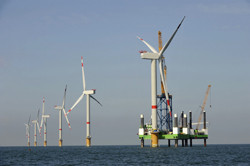Smart coatings for offshore structures
Offshore wind farms are one of the most promising technologies to meet global energy demand in a sustainable way. The EU supported the development of smart materials for improved corrosion and fouling protection of marine structures through funding of the project 'Nanocontainer-based active coatings for maritime applications' (NANOMAR). Nanocontainers are tiny compartments that can store molecules for controlled release. Scientists investigated their use in coatings to release corrosion inhibitors and biocides in response to coating damage. The consortium combined the unique strengths of experts in Brazil, Europe and Russia in this innovative effort. Scientific and personnel exchange, the latter focused on training of young researchers, were important pillars of the project to forge a lasting collaboration. Investigators screened corrosion inhibitors for carbon steel as there is a lack of such substances available for this metal that are adequate for the harsh environments found in offshore applications. The most promising active species were encapsulated in micro- and nanocontainers that could release them in the presence of various triggers. Biocides were encapsulated in organic and inorganic reservoirs. Researchers used the release profiles of the nanoadditives to determine compatibility with coating formulations. As a first step, the corrosion inhibitors or the biocides were integrated in coatings individually to test performance of each one in controlled experiments. The team employed electrochemical techniques, and accelerated tests of corrosion resistance and evaluation of anti-fouling during exposure in offshore platforms. The most promising nanoadditives were combined in a multifunctional coating and subjected to in-service testing on an offshore platform in Brazil. The consortium is now selecting the most promising multifunctional system for industrial implementation. Development of a new generation of smart and sustainable coatings for marine applications will benefit numerous sectors. Among these are energy and shipping, pillars of many economies and vital to global socioeconomic progress.







